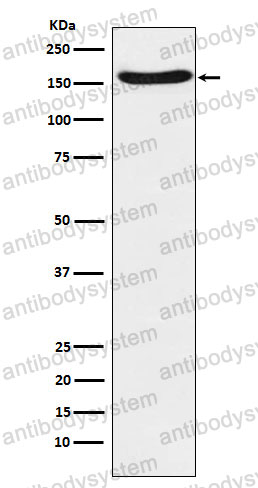Catalog No.
RHA50301
Species reactivity
Human
Host species
Rabbit
Isotype
IgG
Clonality
Monoclonal
Tested applications
IP: 1:20-1:50, WB: 1:1000-1:2000
Target
FAA, FANCA, FANCH, Fanconi anemia group A protein, Protein FACA, FACA
Concentration
1 mg/ml
Endotoxin level
Please contact with the lab for this information.
Purity
>95% by SDS-PAGE.
Purification
Protein A/G purified from cell culture supernatant.
Accession
O15360
Applications
IP, WB
Form
Liquid
Storage buffer
0.01M PBS, pH 7.4, 0.05% BSA, 50% Glycerol, 0.05% Sodium azide.
Stability and Storage
Use a manual defrost freezer and avoid repeated freeze thaw cycles. Store at 4 ℃ for frequent use. Store at -20 ℃ for twelve months from the date of receipt.
Clone ID
R1D81
Case Report: Complete response to four cycles of camrelizumab in a PD-L1 negative patient with advanced oral squamous cancer., PMID:40066447
[Homozygous Variant of FANCM of the Fanconi Anemia Pathway Causes Premature Ovarian Insufficiency: Investigation of the Pathogenic Mechanism]., PMID:38948269
Alloengraftment without significant toxicity or GVHD in CD45 antibody-drug conjugate-conditioned Fanconi anemia mice., PMID:38447038
Gastric cancer with Fanconi anemia in adolescent and young adult patient diagnosed by comprehensive genome profiling using next-generation sequencing., PMID:37934348
Genomic analysis of plasma circulating tumor DNA in patients with heavily pretreated HER2 + metastatic breast cancer., PMID:37336919
Efficacy of chemotherapy combined with toripalimab in PD-L1-positive and high tumor mutation burden pancreatic acinar cell carcinoma: case report., PMID:33345750
Precision medicine phase II study evaluating the efficacy of a double immunotherapy by durvalumab and tremelimumab combined with olaparib in patients with solid cancers and carriers of homologous recombination repair genes mutation in response or stable after olaparib treatment., PMID:32778095
Association of molecular characteristics with survival in advanced non-small cell lung cancer patients treated with checkpoint inhibitors., PMID:32554069
Effective Multi-lineage Engraftment in a Mouse Model of Fanconi Anemia Using Non-genotoxic Antibody-Based Conditioning., PMID:32226796
A comprehensive approach to identification of pathogenic FANCA variants in Fanconi anemia patients and their families., PMID:29098742
Common Variable Immunodeficiency Caused by FANC Mutations., PMID:28493158
V(D)J recombination process and the Pre-B to immature B-cells transition are altered in Fanca-/- mice., PMID:27883081
Immune Thrombocytopenia in Two Unrelated Fanconi Anemia Patients - A Mere Coincidence?, PMID:26106590
p38 Mitogen-activated protein kinase inhibition enhances in vitro erythropoiesis of Fanconi anemia, complementation group A-deficient bone marrow cells., PMID:25534205
Fanca deficiency reduces A/T transitions in somatic hypermutation and alters class switch recombination junctions in mouse B cells., PMID:24799500
Fanconi anemia complementation group A (FANCA) localizes to centrosomes and functions in the maintenance of centrosome integrity., PMID:23806870
FANCD2 but not FANCA promotes cellular resistance to type II topoisomerase poisons., PMID:21414716
Fanconi anemia protein FANCD2 promotes immunoglobulin gene conversion and DNA repair through a mechanism related to homologous recombination., PMID:15601828
Deficient regulation of DNA double-strand break repair in Fanconi anemia fibroblasts., PMID:12748186
Nonerythroid alphaII spectrin is required for recruitment of FANCA and XPF to nuclear foci induced by DNA interstrand cross-links., PMID:12571280
Function of the Fanconi anemia pathway in Fanconi anemia complementation group F and D1 cells., PMID:11750104
Interaction of the Fanconi anemia proteins and BRCA1 in a common pathway., PMID:11239454
The Fanconi anemia protein FANCF forms a nuclear complex with FANCA, FANCC and FANCG., PMID:11063725
Posttranscriptional cell cycle-dependent regulation of human FANCC expression., PMID:10845936
Analysis of epitope-tagged forms of the dyskeratosis congenital protein (dyskerin): identification of a nuclear localization signal., PMID:10744426
A deficiency in a 230 kDa DNA repair protein in fanconi anemia complementation group A cells is corrected by the FANCA cDNA., PMID:10469633

